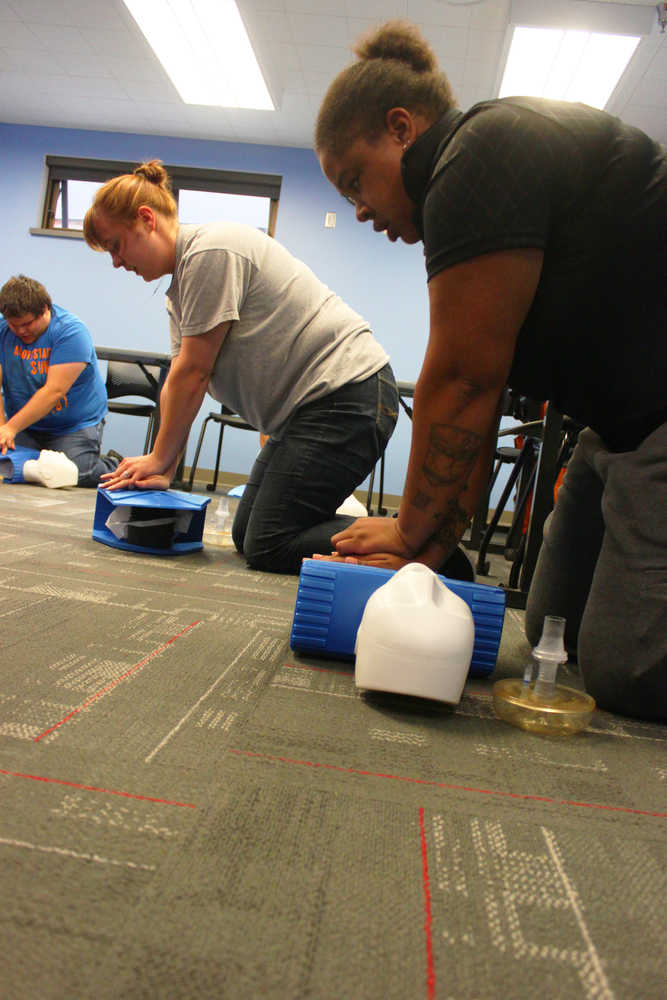For the second year of Kenai Peninsula College Residence Hall resident advisor training, Associate Director of Residence Life Tammie Willis refined the series of exercises to meet the level of her advanced staff.
Five of six RAs are returning, and the newest addition worked at the front desk last year, Willis said. After working in residence life as the first staff members at the one-year-old residence hall, the courses for the second round of training required some tweaking and specialization.
The twelve days of training began August 8 with a six-hour instruction course on CPR.
The awareness of this group is more advanced than the standard training covers for topics in relation to diversity, Willis said. They were hired already able to think on this higher level, she said.
Willis said she constructed exercises aimed at helping the group identify the social issues they are most interested in and translating that into programs within the residence hall to assist other students in handling the specific demographics found in their peers KPC. She said two very specific majorities are the students coming from rural areas in the state, and Native students.
She played a variety of songs with content discussing issues such as racism, the LGBT community and gender roles and asked each RA to pick the one that caught their interest and dissect it.
The result of the exercise was a developing comprehension on different ways to encourage social change within their own community, Willis said.
“It’s about turning their passion into action,” Willis said.
The size of the group opened up an uncommon intimacy between a staff of RAs, said Willis, who has worked in residence life for 15 years.
Because the group was so small, and most members had already gone through much of the training at different points in the past year, RA Joshuah Rutten said the training began one week later than is standard for residence halls. Courses were also more advanced and expanded on the knowledge and experience everyone gained from the last year.
Rutten said he walked away from the training period with a better grasp on how to identify conflicts in his peers that have occurred in his own life.
During the instruction on addressing mental health and behavior, Rutten said he was constantly thinking about his father, who he discovered was diagnosed with bi-polar disorder before he passed away.
“I was oblivious to it,” Rutten said. Now he is more aware of the symptoms that others may be experiencing.
Willis said that drawing connections between each session is important for the RAs. From addressing substance abuse and bullying and harassment, to ethics and Family Educational Rights and Privacy Act, or FERPA, the students need to know how they all tie in and relate to each other.
“We are a role model to the community,” Rutten said. “Life is like a fishbowl when you live here.”
When developed correctly, a residence life community operates like a small society, even self-policing, Willis said. If a student is drinking in the hallway, another walks by and will tell him to go back in his room.
Rutten said there are three levels to identifying and addressing issues in the dorms. Students may ask staff for help directly, indirectly or they may not ask at all.
RA Kirsten McBride said Residence Life Coordinator Leslie Byrd is consistently emphasizing the importance of engaging with the students in their quads, which have 16 students to each RA. McBride said an example was learning when it is appropriate to pull a struggling student aside to find out what may be contributing to the situation.
McBride taught the psychology of disaster to her fellow RAs during the training.
“You did a great job with that,” Rutten said to McBride, while the two stood beside the front desk in the residence hall.
McBride said there were specific situations such as ash fall from an erupting volcano that may actually arise at KPC.
Willis said the training is designed to give her staff the tools and confidence to wear the many different hats they will be asked, and have been asked to wear during their time as an RA.
For the final course, Emergency Manager of the University of Alaska Police Department Lt. Ron Swartz came for two days to certify the RAs, desk aides and maintenance staff in the Campus Citizen Emergency Response Team, or CCERT, which trains groups on how to respond to natural disasters.
“CCERT training is not something that is standard,” Willis said.
RAs are the first responders on campus, she said. And with this training they not only can help in the residence hall, but on the entire campus and then go out into the community.
Kelly Sullivan can be reached at kelly.sullivan@peninsulaclarion.com.

